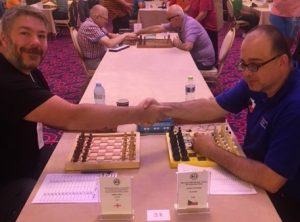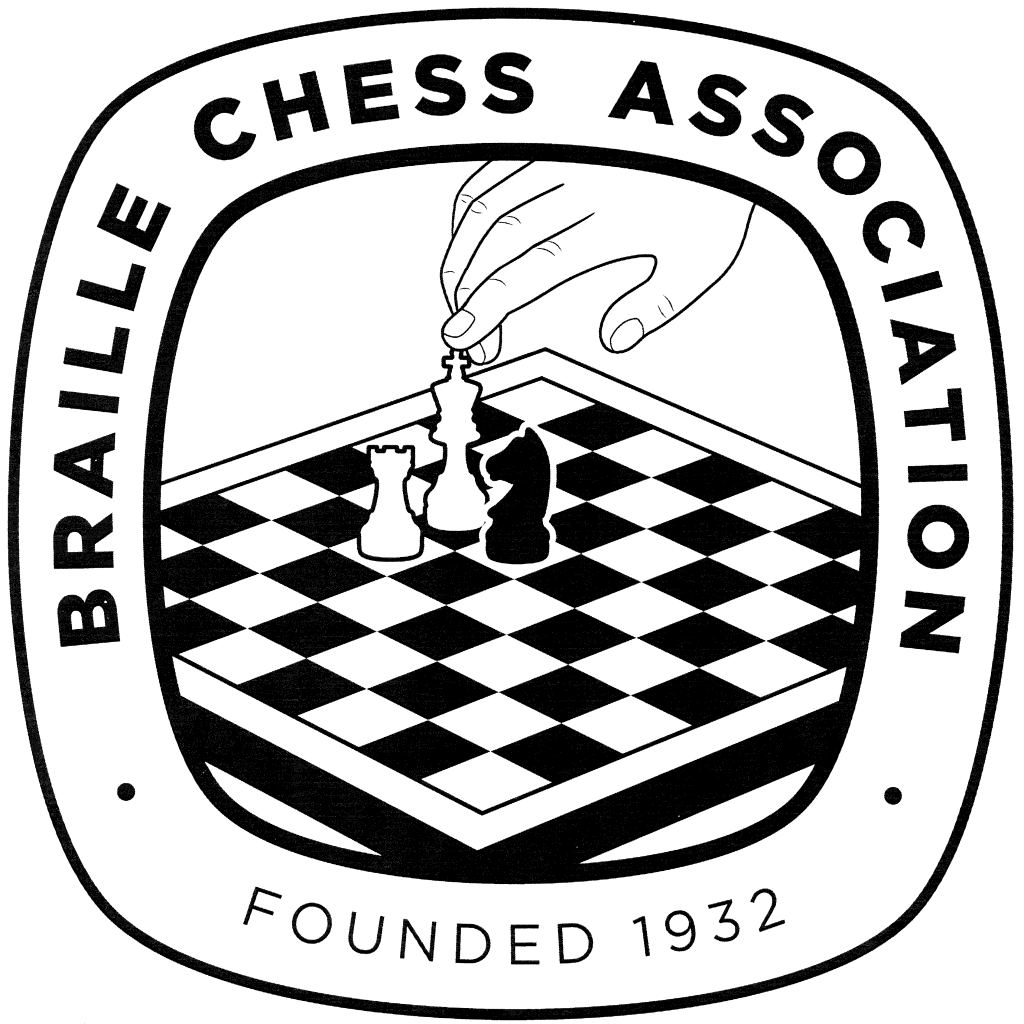Gary Hogan writes:
A few months after surprisingly finishing joint second with Steve Burnell in my first tournament in Harrogate, April 2023, I received an email inviting me to represent the BCA at the 2023 IBCA World Individual Chess Championship for the Blind and Visually Impaired from 8th – 18th October 2023, Rhodes, Greece. I obviously jumped at the chance! Although nervous, I was determined to do everything I could to improve and to represent the BCA in the best way possible.
Owen Phillips offered to be my coach and I eagerly accepted. We had had a really interesting draw in Harrogate, where Owen had won the tournament, and I was looking forward to learning all I could from him. Owen was a very keen coach and we were in contact almost every day. I also played a lot of puzzles on chess.com and watched YouTube videos from Gotham Chess and John Bartholomew. I entered a rapid play tournament in Greater Manchester but it was too much too soon. I scored a draw and five losses from six games and learned that I had to be mentally tougher. But it was a good learning experience and I felt I had prepared as well as I could before the tournament.
My first game was against a very strong Spanish opponent. I played the London and lost a pawn early on, followed by another. I think I was slightly outclassed by a player who Owen thought was underrated. My second game was against a player from Moldova. I played a Benoni which was equal until I made a blunder which lost a whole rook and after that I couldn’t recover. I couldn’t get away with lapses in concentration like that at this level.
In round 3 I had white against a Dutch player. I felt I was under a lot of pressure but saw an intermezzo check to gain a pawn. Eventually my opponent resigned and I notched up my first point!

My round 4 opponent was Josef Polnar of the Czech Republic – see photo above. I felt I came out the opening on top with my bishops on long diagonals pointing at my opponent’s king. My pawn on e4 was getting in the way but if I could just push the pawn, the position would open up to my advantage. However, I overlooked a pawn as my mind was focused on the attack. When my attack fizzled out, my opponent was a pawn up and pushed his pawn majority to win the game. From this game I learned that even when attacking I must still guard pawns that may appear insignificant at the time but ultimately can win the game.
In round 5 I faced a player from Uzbekistan. The game was a Benoni and I had white. Remembering opening principles, I thought I didn’t have enough influence in the centre so I activated my bishop on b2. After the opening I found myself in a decent position but my opponent had a strong knight on e5 and I was struggling to dislodge it. My opponent found a strong check and I felt like I was defending for my life! But shortly afterwards my rook was in a strong position and my opponent was vulnerable on the back rank. I infiltrate to hunt down the enemy king, while ensuring that I was safe from checks, and my opponent resigned just before mate.
Round 6 brought another Dutch opponent. The game was a King’s Indian, which my coach and I had prepared for. However, after an unexpected move from my opponent, I took about 30 mins for the next move, thinking my queen was trapped. I emerged a knight down, but my opponent’s rook was still ineffective on h1 so I got my pieces out quickly and attacked. From nowhere I was suddenly in a much better position. However, I only had 6 minutes left on the clock and my opponent offered me a draw. I looked at the whole game instead of assessing the current position and for most of the game I had been losing so a draw seemed like a good result, especially considering how little time I had left. I took the draw. Five minutes later I thought “What have I done?”. I feel I should have carried on and pressed for the win. It wasn’t certain but I was in a good position. I will put that down to inexperience. (My first OTB game was in Feb 2023).
Here is my round 7 game: Gary Hogan v Miroslav Madjeric (Croatia)
1. d4 d5 2. Bf4 c6 3. e3 Bf5 4. c4 e6
The London System. My opponent’s bishop is outside the pawn chain and I thought I would go for the weak b7 pawn with my queen.
5. Qb3 Qb6
Black offered an exchange of queens to defend his pawn but I knew that in these positions it’s advantageous to make your opponent initiate the trade so I pushed c5 more or less forcing it.
6. c5 Qxb3 7. axb3 Nd7 8. Nc3 Ngf6
On these occasions the “London Bishop” on f4 becomes very strong. I created a retreat for my bishop, if required, and pushed the b-pawn. I became aware of this type of play only a few months ago, when I played a friendly against one of our best players on a normal club night in Witney. I played as black and he absolutely strangled me. I couldn’t move any of my pieces! Afterwards he explained how to play the position and I went straight home to study it. This was how I played my round 7 game.
9. h3 Be7 10. Nf3 O-O 11. b4 Ne4 12. Nxe4 Bxe4 13. Nd2 Nf6 14. b5 h6 15. bxc6 bxc6 16. Ba6 Rac8
Black blundered the exchange in an already weak position. A White win was only a matter of time and focus.
17. Bxc8 Rxc8 18. O-O Bd3 19. Rfd1 a6 20. Ra3 Be2 21. Re1 Bb5 22. Nb1 g5 23. Bh2 Bd8 24. Nc3 Bc4 25. b3 Bd3 26. Rd1 Bb5 27. Nxb5 axb5 28. Rda1 Ne4 29. Ra8 Resigns.
I was feeling confident after this game.
In the penultimate round I had black and faced a Finnish opponent who opened with e4 as I thought he might. I had been studying the Caro Kann the night before and most of the morning. I was thinking it may turn into a Panov attack or a Tartakower defence. Early in the game I felt that my only real option was to trade knights, queens then bishops. Later on, trying to get an advantage in the endgame, I focused on taking a Black kingside pawn and it became a pawn race. I had less than two minutes for the last twenty moves and after four hours of play I was struggling to call out the moves in German, write them down, decide what I wanted to move and ensure I wasn’t making a mistake. This was my first OTB time scramble. My heart was beating 100 mph and my hands were shaking! With two connected pawns on the third rank, protected by a rook, I was sure I was going to win but my nerves got the better of me. Without thinking clearly, I pushed my pawns, calculating that, after promotion, my rook and new queen would be defending each other. They weren’t! I was devastated. A win would have put me on 4.5 points going into the last game and I threw it away. In the end I thought that I can only learn from this and make sure it doesn’t happen again. Costly lesson though!
In the final round I had black again and was up against a Lithuanian opponent. Owen and I decided I would play the Hippopotamus opening. I hadn’t even heard of it before the morning of the game but it is relatively simple to learn with clear plans and ideas, so I was happy to give it a go. My opponent played the London System and once he had castled, I started moving my pawns and pieces towards his king. I felt I had a better position and hoped to pile on the pressure. In retrospect I think I should have moved some more pieces closer to the action sooner, as ultimately what had looked like a good attack lost its potency. The position was quite equal, although I would say my opponent’s pieces were more active. I offered a draw and my opponent accepted so I finished on four points from nine games, in joint 48th place in a field of 82 players from 29 countries around the world. The event was won by Polish GM Marcin Tazbir with an unbeaten 8 points.
Looking back at my performance I am proud of what I achieved. I let my inexperience show on at least three occasions and I hope I won’t be making those kinds of mistakes in the future. I really enjoyed my time in Greece. The tournament organisers, hotel staff and other competitors contributed greatly to an amazing experience. Finally, I would like to thank Owen Phillips who taught me so much during my time out there. He was also terrific company, and we had a great time away from the chess board, especially during the closing ceremony when we could relax with a few well-earned Cuba Libres.

